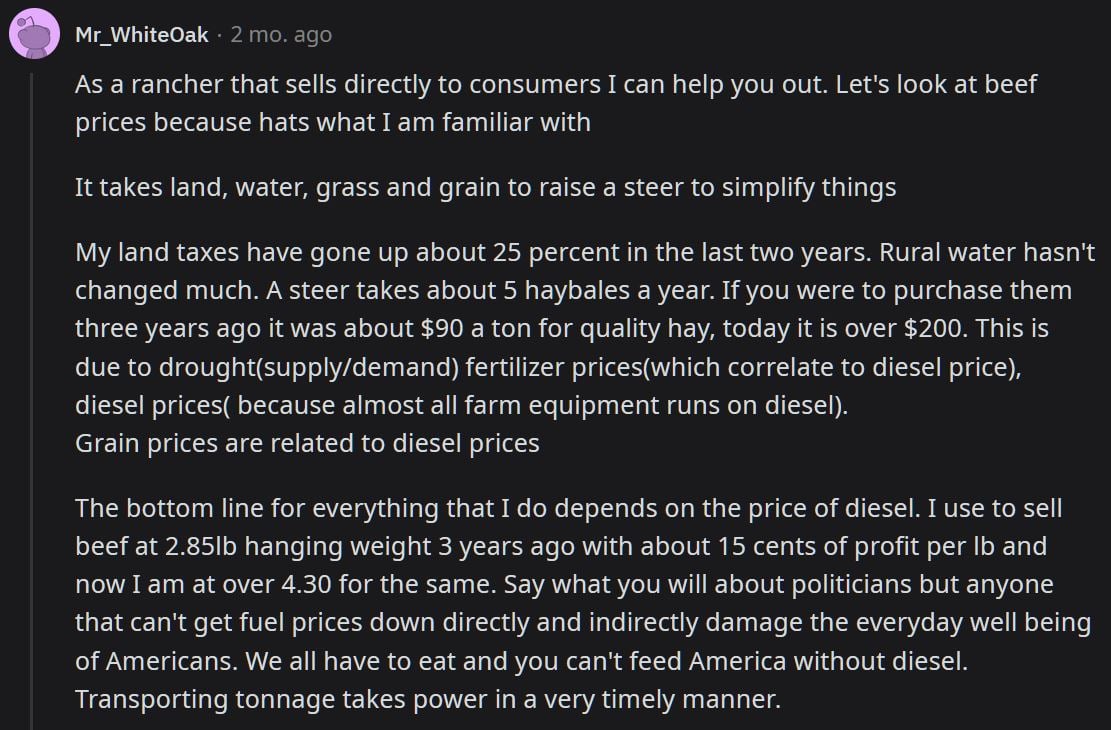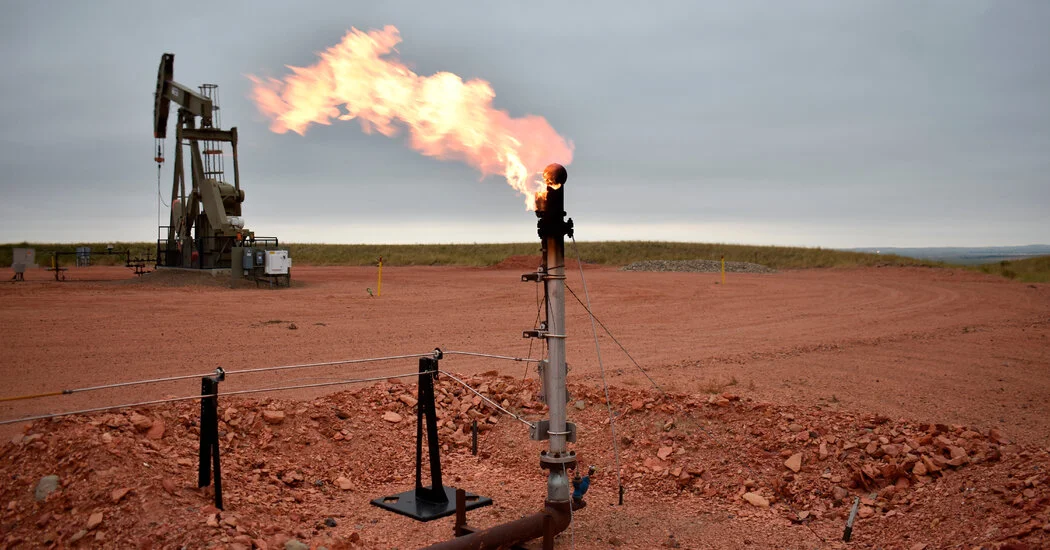The higher the number, the greater the government’s justification for compelling polluters to reduce the emissions that are dangerously heating the planet. During the Obama administration, White House economists calculated the social cost of carbon at $42 a ton. The Trump administration lowered it to less than $5 a ton. Under President Biden, the cost was returned to Obama levels, adjusted for inflation and set at $51.
The new estimate of the social cost of carbon, making its debut in a legally binding federal regulation, is almost four times that amount: $190 a ton.
Thats huge!
Definitely, and still way below the numbers that have been showing up in the academic literature over the past couple years.
It’ll have to survive the next election. Republicans will of course only hammer the negative impacts on businesses.
Of course. Pretty much every positive action by the US government has this issue.
I thought 250 usd/ton was one of those numbers from literature?
Whats proposed nowadays?
Up to $525/ton
Ok. Still 200 is better than 50.
Considering Trump wants it at $5 I would consider the current progress fantastic.
Got a source, and also how you go about keeping yourself updated on that number
The full article is paywalled, but the abstract of this meta-analysis states “In the past 10 years, estimates of the social cost of carbon have increased from US$9 per tCO2 to US$40 per tCO2 for a high discount rate and from US$122 per tCO2 to US$525 per tCO2 for a low discount rate.” Published May 15 of this year.
It would be nice if these numbers didn’t yo-yo with each administration. Even if one is pro-low price, it must fuck up long term plans tremendously.
(I am pro-high cost of fossil fuels, but want process to increase at a steady and predictable rate. $1 million in steps every 6 months is very different from $1 million in one step at any point in time.)
You are right, but these numbers are intrinsically affected by value-judgements - about how to integrate impacts over time, across different sectors, across rich and poor countries/communities and over probability of such impacts (risk aversion). It’s not so much the science changing, but the values - hence political shifts. It would help if experts could separate these factors more clearly. For example people mention “the discount rate”, but there is not just one - there is a (low) pure time preference for the whole world and higher rates for individuals and companies with finite lifetimes, also higher in rapidly developing countries (this does make sense, given a non-linear welfare function).
The new number will be put into action right away: the E.P.A. plans this spring to release final regulations to curb carbon dioxide from cars, trucks and power plants.
The impact on power plants should not be underestimated. This is a win, and hopefully we’ll be able to ween ourselves off fossil fuels and coal more quickly if it hurts these power companies bottom line.
Hopefully this will also move into the private airplane business, and cruise line industry.
Cars will take more time, because we have to cycle the old fossil fuel engines for newer cars that just aren’t cost effective right now. Not to mention, some people will want to keep their gas powered car.
Honestly?
I’d totally go on a sail and solar powered cruise line. That’d be cool as fuck.
My gas powered car is paid off, any electric car isn’t, and any electric car with equivalent space for my family and bimonthly Costco trips and equipment to make the ride comfortable would run me $50k. Guess which one I’m driving for the foreseeable future.
Nobody is talking about forcing you to get rid of your old car: they’re talking about making new ones be electric, so that we see full replacement as people scrap old ones.
Re-read the comment I replied to and my own. I want an electric car, they’re just not economically feasible for most people, and will likely remain that way for the foreseeable future. People can’t afford electric cars with reasonable seating for a family and space for their stuff.
The Chevy Bolt is big enough for the average family and starts at $27k before incentives.
A close relative of mine has one, so I can speak specifically to my problems with it. It’s a tin can and feels it every time you open or close a door, let alone when you use the interior compartments. It doesn’t have power nor heated seats and the manual adjustments are frustrating at best, and the cloth doesn’t clean easily from children’s snacks. Also, it makes a high pitched noise inside the cabin at low speeds that’s absolutely aggravating. Finally, the “trunk” is smaller even than another relative’s Mazda3 Hatch, even including the compartment underneath the main area in the Bolt. It cannot fit four carryon sized suitcases and maintain rear visibility.
None of those issues have anything whatsoever to do with it being a EV. It’s a GM product deep into the economy price bracket, and you’re complaining about a lack of power seats or cheap sounding door closure? It’s a cheap car, it’s no surprise that cheap cars lack in luxuries.
Being a cheap car is kind of the point though. There are family friendly 4 door EVs in most new car buyers’ price brackets, from cheap hatchbacks to the fastest super cars and almost everything in between.
Not all cheap cars lack in luxuries let alone normal things like space for luggage; bad cheap cars do which is why I keep harping on the Bolt in particular. There are good electric vehicles out there, I’m sure, they’re just not in every price range, as an average new car price of $40k is beyond what most people can actually afford when inflation’s been hammering their food and housing expenses. The Bolt’s niche, at roughly $20k after tax credits, means it’s competing with lightly used Civic/Corolla/Mazda3 vehicles, all three of which are much better cars overall, and have decades of reliability. If you can’t depend on a Bolt and it feels cheap when it works perfectly, what working class person is going to want one?
You can make cheap ones. The Chevy Bolt was just fine. It’s that automakers decided giant trucks for the wealthy are more profitable, and that the rest of us have to live with used vehicles.
The Chevy Bolt is cheap and feels it. Read my other comment on it; I have driven one more than a few times, ridden in one even more often, and it’s absurdly bad compared to even a base level Mazda3 in interior quality. It honestly feels cheaper than my my first car, an early 90’s Toyota Tercel, let alone compared to a modern import. If the Bolt is the future of EVs, we’re doomed, because it’s not fun to drive and every moment in it is a reminder that it’s cheap for a reason. It may be better than the Prius C due to being an EV, but that’s not exactly a high bar to clear, and I’m pretty sure it will lose where it counts, customer satisfaction. I can’t imagine someone with the money to buy something better puts the money down for a Bolt and is happy with their decision after six or 12 months, let alone the decade plus that we all should be keeping our vehicles to defray the environmental cost of their construction.
That leaves people with limited financial options, the people forced to buy either a used ICE vehicle or the cheapest EV when their old car dies; you’ll probably recognize them as the working poor (and their ranks are growing thanks to runaway capitalism). If the solution is to force them into terrible vehicles, perfect; the Bolt should serve as a wonderful reminder that profits are valued above them at every step.
I agree that it is cheap. It’s entirely possible for manufactures to do a lot better at that price point, but it’s less profitable.
Right, and since profits are king, the affordable electric cars will stay terrible because an ICE is $1k or so to manufacture while an electric power train including battery is at least five times that in cost. When you look at a $27k car, tax incentives excluded (especially because some people will be unable to use them), the electric car has to be cheapened, every corner cut, or the profits just won’t be there.
Again, it’s dollar for dollar, when you sit in a $20k Mazda versus a Chevy Bolt that will cost the same if the full $7k tax incentive is realized, the quality difference is tangible. Until that’s addressed, there won’t be people wanting to buy that car.
There are plenty of electric cars under $40k these days. And guess what? If the demand rises, then economy versions will be released.
I was able to get my EV for about 33k after trade in and some haggling. It made sense for our monthly cash flow because I was still paying on the gas car though.
Plenty of electric cars under $40k? Name five good ones, ones where they don’t rattle incessantly and when you shut the door you don’t feel surrounded by a sea of the cheapest plastics (offgassing the whole time naturally). I can tell you from personal experience the Bolt isn’t a good one. And just to be clear, my standard isn’t Lexus or Maybach, I’m comparing with Honda Accord/Toyota Camry/Mazda CX-5 for interior and overall quality.
I love this comment. It’s like ‘Yea, I want to help , but have you seen electric cars? Oh my gross! Oh well, come on kids, hope in the gas car, let me drive you to the crematorium.’
More like, “Hey kids, do you want to be in a vehicle that filled with plastics that happens to catch fire?”
https://www.nhtsa.gov/press-releases/recall-all-chevy-bolt-vehicles-fire-risk
https://www.nhtsa.gov/press-releases/consumer-alert-important-chevrolet-bolt-recall-fire-risk
Electric vehicles could be good, the cheap ones , specifically the Bolt, are not.
“I had a bad experience with a single EV, so all of them must be bad.”
I think you’re misunderstanding me. I continue to say there are probably good EVs out there, the Bolt isn’t one of them. That’s all I’ve ever said, and people keep interpreting that as an attack on EVs in general. I want an affordable EV with the usable space and interior quality of my 2010 Mazda3. Is that a condemnation of all EVs, and if so, what does that say about EVs?
In case this is an actually sincere question, Hyundai kona ev can be purchased for 30k range with federal and state incentives and is fine for 90% of commuting needs and has good range for longer trips. With a child and 65 lbs dog, it’s been our primary/ only vehicle for a few years now and no real issues. Do I want a good electric van when one hits the market at a reasonable price? For sure. But if you actually want an ev for family use, there isn’t much truly stopping you.
The Hyundai/Kia offerings look interesting but the nearest dealership is 40 miles away and that’s more than I can do to go test drive a car. How’s the interior, equivalent to a Honda at least?
Does any one have a link to the estimation process?
Removed by mod
So the “social cost” is magically whatever they need it to be? I guess the next republican administration lowers it to about $3.50…
It’s an estimate of how much damage a given amount of emissions does. The number has risen as we have gotten a better understanding of how damaging greenhouse gas emissions are
Seems more likely that it’s policy driven, not science driven. I’d like to see the peer-reviewed science that quadrupled the number.
I wonder how this will affect the price of diesel. From what I’ve read from farmers that is the main thing driving the price of food up. Whether it’s meat or veggies. It takes lots of diesel to run a farm, and this could have serious implications for our food prices.
I just want to be clear that as an outdoors person I also would like a cleaner environment, but I also have to eat. I eat what I kill. So, it’s important that the environment be clean. But, I can’t live off meat and veggies that I kill / forage.
Yes but climate change will have dramatically negative effects in agriculture in the long term. The cost of food can’t always be a silver bullet objection to climate regulation. We can undoubtedly find ways to grow food with less carbon cost if there is economic incentive for it, and long term impacts need to be considered even more than short term when we consider how bad the projections are.
Removed by mod
So … let the world burn?
Removed by mod
Removed by mod
Most of what we buy is artificially underpriced. This is in part because of government subsidies coming from our taxes. The other part, is significant exploitation of people out of your sight and mind.
When our lifestyle is priced at what it is due due human exploitation and suffering you have too options: exploit even harder to reduce prices or start paying a humane price for things. We’ve got it good in the West.
Removed by mod
As a parent, I’d think you would be particularly concerned about the long term impact of carbon emissions. If food is expensive now, what is going to happen to your kids’ quality of life when changing weather makes it impossible to raise food in traditional farming areas? Pretty much every model shows rapidly increasing food prices at best, widespread starvation at worst.
I’m sorry you’re struggling to feed your kids and I’m kinda baffled why you are assuming I have no sympathy for those in a bad spot. Perhaps a better solution would be to push for better government assistance for those who can’t afford food. Loosening carbon regulations to reduce food prices is just kicking the can down the road so the issue will be far worse when your children are adults.
deleted by creator
Also, here is something I’d like to share. This guy is talking about beef, but it applies to all agriculture. Veggies maybe even more.






